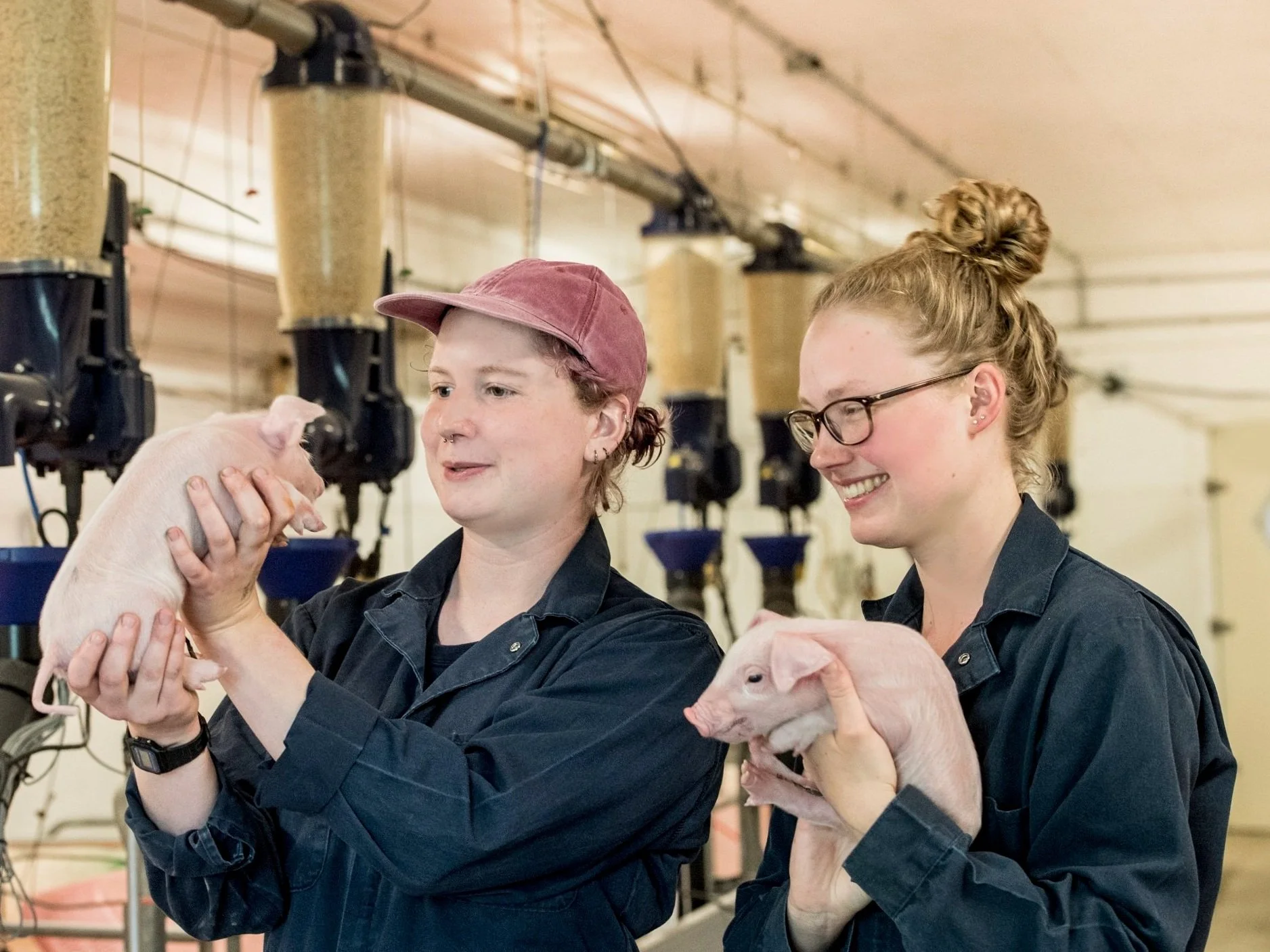The General Manager of Sask Pork says the biggest contribution the public can make to the effort to eliminate feral pigs from the environment is to report sightings. Mark Ferguson, General Manager of Sask Pork, noted wild boar have been identified as major problem, not just in Canada but around the world.
Read MoreA swine nutritionist with the University of Saskatchewan says, if flow issues can be resolved, pea starch can provide an excellent source of energy in swine rations. Research conducted by the University of Saskatchewan in partnership with the Prairie Swine Center and the Canadian Feed Research Centre in North Battleford showed pigs fed pelleted rations containing 40 percent pea starch grew really well with great feed efficiency.
Read MoreLast week's U.S. Supreme Court ruling on California’s Proposition 12 is expected to result in higher pork prices in that state while placing added financial pressure on pork producers throughout North America. Florian Possberg, a partner with Polar Pork Farms, said that California accounts for about 15 to 20 percent of U.S. pork consumption and California tends to set the standard for other states in terms of animal welfare.
Read MoreThe Manager of the Canada West Swine Health Intelligence Network (CWSHIN) says its new five-year strategic plan will place a greater emphasis on diseases that are causing challenges closer to home. CWSHIN is putting the finishing touches on a new strategic plan that will guide activities over the next five years, until the end of March 2028.
Read MoreResearchers with the Western College of Veterinary Medicine (WCVM) are evaluating the long-term effects on welfare and productivity of providing environmental enhancements to piglets during their first weeks of life. In an effort to improve the lifetime productivity of pigs, researchers with WCVM are exploring the effect of early life management strategies on longer term welfare outcomes.
Read MoreThe General Manager of Swine Innovation Porc says the pork sector's planned next swine cluster research program will focus on pork sector sustainability, competitiveness, productivity and resiliency. Swine Innovation Porc, the national organization for research in the pork sector, submitted its application to Agriculture and Agri-Food Canada in January for funding for 19 projects being proposed under Swine Cluster-4.
Read MoreA swine nutritionist with Western Ag Supply says by purchasing low-cost opportunity feed ingredients, feeding according to nutritional requirements and managing feed wastage pork producers can reduce their feed costs and improve their profitability.
Read MoreOne of the driving forces behind Sask Pork’s consumer promotions is being recognized for her exceptional efforts in agriculture. Dorothy Long is being formally inducted into the Saskatchewan Agricultural Hall of Fame tomorrow. Long is a lifelong champion of Canadian food and farming, having worked for nearly 30 years to promote Canadian-grown foods and the industry that produces them.
Read MoreAn international research effort, with ties to Saskatchewan, is looking at the potential of measuring hormone levels in the hair of pigs to identify genetic lines that will be less affected by stress. Researchers with Iowa State University, the University of Saskatchewan, the University of Alberta and CDPQ are collaborating on a project under which the levels of three stress hormones in the hair of pigs are being measured to evaluate the effect of stress on performance and on disease resilience.
Read MorePig heard health is about to improve in a big way, thanks to a new vaccine developed by the Western College of Veterinary Medicine to prevent Strep zoo and avoid treatment with antibiotics. Streptococcus equii zooepidemicus, or Strep zoo, is a difficult to diagnose bacterial disease that can cause sudden death without warning, or soon after pigs develop fever and go off feed, but, in either instance mortality rates will be high. In response, researchers with the Western College of Veterinary Medicine have created a new vaccine to prevent the infection.
Read MoreA multi-institutional team of scientists is conducting research aimed at replacing antibiotics with probiotic bacteria to combat diarrhea in nursery pigs. In response to public concerns over antibiotic use in livestock production and the potential for antibiotic resistance, scientists with Agriculture and Agri-Food Canada, the University of Saskatchewan, University of Manitoba, and the University of Guelph, with funding from Swine Innovation Porc, are working to develop viable alternatives to antibiotics in nursery pigs.
Read MoreThe CEO of Signature Swine Solutions says the quicker a pig is identified as sick and is treated, the less discomfort it will endure and the greater chance it will have at recovery. Sask Pork hosted the first in a series of three spring webinars yesterday, "Practical Pig Handling and Animal Care: Tips & Tricks." Mara Rozitis, the CEO of Signature Swine Solutions, told attendees that pigs will hide their disability so they are often quite far down the path of illness before they are identified as sick and receive treatment.
Read MoreSask Pork is marking Canadian Agriculture Literacy Month with an educational blitz in classrooms across Saskatchewan. March marks the 12th year of Canadian Agriculture Literacy Month (CALM), a month-long initiative whereby the agricultural community takes to classrooms across the country to offer hands-on activities and programs for students. Sask Pork staff and volunteers visited 241 students in 9 classrooms across the province.
Read MoreA partner with Polar Pork Farms says a new Saskatchewan based cull sow slaughtering plant will reduce the cost of shipping sows to slaughter, minimize the risk of transmitting disease from one country to the other and avoid the complications that result from border closures.
Read MoreA partner with Polar Pork Farms says the conflict in Ukraine continues to influence feed grain prices contributing to reduced profitability for pork producers and higher food costs for consumers.
Read MoreSask Pork's Whole Hog Youth Ambassador says the public needs to be aware that food doesn't just appear in the grocery store, it is produced through the hard work of farmers. Sask Pork’s Whole Hog Youth Ambassador Program, launched in January, is designed to bring youth into the discussion of how pork is produced and where our food comes from.
Read MoreThe General Manager of Sask Pork is suggesting the Canadian pork sector's dependence on exports makes the prevention and preparation for foreign animal disease critical.
Read MoreAn independent economic analysis has demonstrated money allocated to pork research in Canada is win-win for the pork sector and for government, finding the resulting advances improved the sector's productivity by three and a half percent. The analysis found the research is leading to better outcomes and technologies, such as new vaccines, improved genetics, better feeding strategies and better product quality, to name just a few.
Read MoreSaskatchewan's Minister of Agriculture says the cull line being incorporated into the North 49 sow slaughtering plant in Moose Jaw provides the infrastructure to deal with market disruptions triggered by a foreign animal disease. In response to the threat of African swine fever, the Government of Saskatchewan and Sask Pork have committed $1 million swine disease mitigation, including adding a dedicated cull line into the North 49 processing facility.
Read MoreSask Pork's Whole Hog Youth Ambassador says it's important for people to be more aware of where their food comes from and lots of other products too. Sask Pork’s just-launched The Whole Hog Youth Ambassador Program is a new agricultural education program designed to help share the story of pork production in spite of the biosecurity protocols that make communicating with consumers such a challenge.
Read More



















